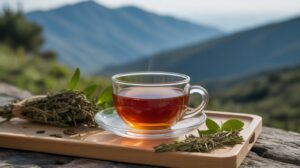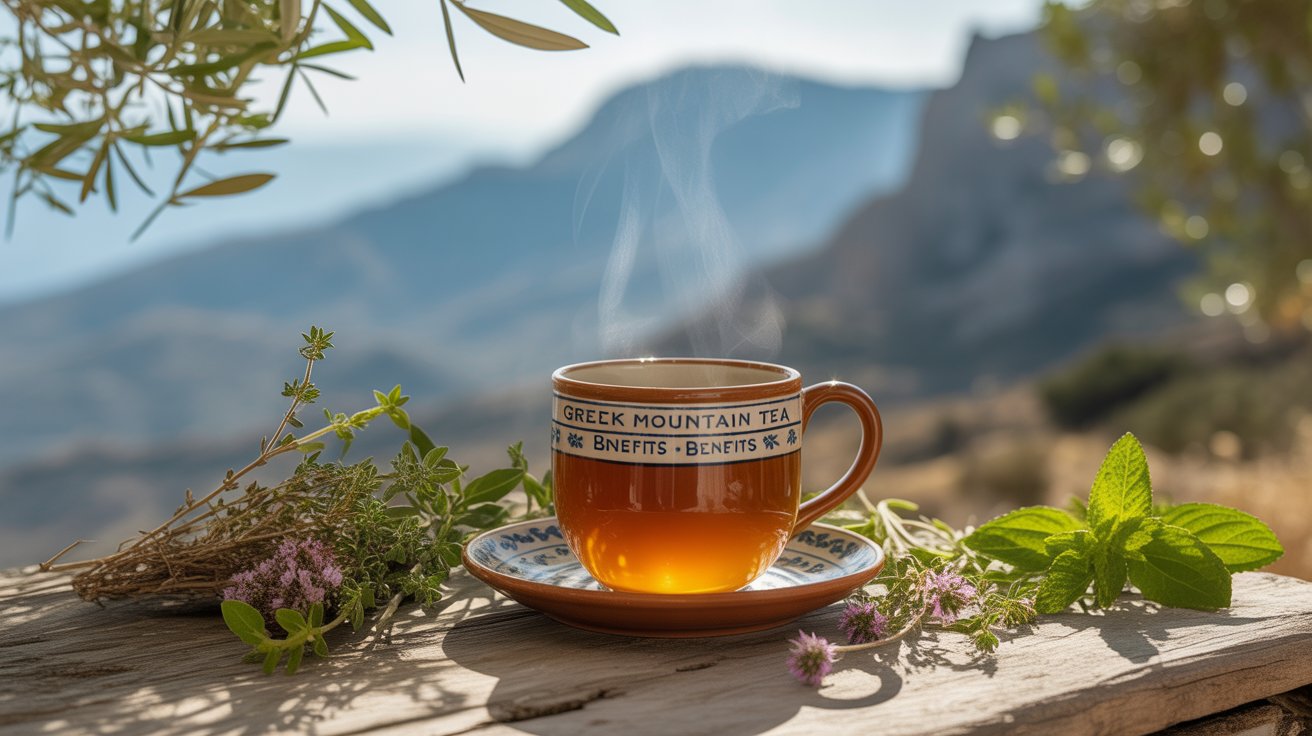Struggling with stress, brain fog, or seasonal colds? Greek mountain tea might be your natural secret weapon.
While foraging wild Sideritis scardica near Mount Olympus, I felt firsthand the calming clarity this ancient herb delivers. Its floral aroma and earthy strength have been trusted for centuries—and now, modern science is catching up.
Packed with antioxidants, this caffeine-free tea supports immunity, digestion, and even cognitive health.
In this guide, I’ll break down exactly what the research says, what benefits you can expect, and how to brew it for maximum impact. No fluff—just facts, history, and a plant that’s earned its place in your cup.
Why Seek Out “Tsai tou Vounou”?
Because you’re tired of the same cycle: wake up groggy, push through brain fog, crash by 3 PM, and battle yet another sniffle.
Greek mountain tea—known locally as Tsai tou Vounou—isn’t just another trendy herbal drink. It’s been used for centuries to fight off the exact problems most of us face daily.
Here’s what it’s known to help with:
Recurring colds & weak immunity – Contains natural antimicrobial compounds
Indigestion & bloating – Soothes the stomach, supports gut balance
Anxiety & sleep issues – Calms the nervous system without making you drowsy
Brain fog & fatigue – Supports cognitive clarity and focus
Mild hypertension – Shown to gently reduce blood pressure
Iron deficiency risk – Unlike the name “ironwort” implies, it’s actually safe for iron-sensitive individuals
People don’t drink it just because it’s ancient. They drink it because it works.
What Is Sideritis scardica (aka Shepherd’s Tea / Ironwort)?

Sideritis scardica is the real name behind Greek mountain tea. But it goes by many nicknames—Shepherd’s Tea, Ironwort, and in science circles, just Sideritis.
This isn’t your average herbal leaf. It’s a flowering plant that thrives on rocky Greek mountainsides, often above 1,000 meters, soaking in sun, wind, and wild soil. That’s where its strength—and health benefits—come from.
Let’s break it down:
Varieties You Should Know
Not all Greek mountain teas are created equal. There are three main species worth remembering:
| Botanical Name | Common Name | Region |
|---|---|---|
| Sideritis scardica | Olympus Mountain Tea | Mount Olympus |
| Sideritis syriaca | Malotira | Crete |
| Sideritis raeseri | Parnassian Tea | Mount Parnassus |
Each grows in different microclimates. Each has slightly different flavors and active compounds. But they all belong to the same powerhouse family—Sideritis—known for its immune-boosting, anti-inflammatory properties.
Tip: If you’re buying online, look for the species name on the label. S. scardica is often studied the most in scientific research.
A Remedy with History
Hippocrates praised it. Dioscorides documented it. Theophrastus noted its power in ancient texts.
For centuries, Greek shepherds brewed this tea after long, wind-beaten days in the mountains. It helped them stay warm, fight off illness, and soothe sore muscles.
Today? You get those same centuries-old benefits—with none of the goat herding.
That’s what makes Tsai tou Vounou so special. It bridges the gap between traditional wisdom and modern wellness—one cup at a time.
5 Science‑Supported Benefits from Drinking Greek Mountain Tea

If you’re sipping Greek mountain tea for the taste alone—you’re missing the best part.
This ancient herbal brew does more than warm you up. Backed by growing research, Sideritis scardica delivers serious health perks in every cup.
Let’s break down what science—and tradition—agree on:
1. Antioxidant & Anti‑Inflammatory Power
Greek mountain tea is rich in polyphenols and flavonoids like xanthomicrol and isorhoifolin—natural compounds that fight oxidative stress.
Why that matters: Oxidative stress ages your cells. It’s linked to inflammation, chronic disease, and even joint pain.
Studies show Sideritis can reduce markers of inflammation, especially in arthritis and fatigue models. One study compared it to green tea—and mountain tea held its own.
Bottom line: It’s not hype. You’re drinking real cellular defense.
2. Digestive & Gastroprotective Relief
Bloated? Acidic? Gut acting up? This tea has your back.
Research from Planta Medica and German universities revealed Sideritis helped protect rats from induced gastric ulcers—without pharmaceuticals.
It soothes the stomach lining, relaxes intestinal spasms, and reduces discomfort after meals.
Drink it warm, post-dinner, and feel the calm roll in.
This is one reason Greek grandmothers swear by it after every meal.
3. Immunity Boost & Cold Relief
This tea has been used for centuries during cold and flu season—and for good reason.
Its compounds show antimicrobial action against pathogens like E. coli, while also reducing inflammation in the upper respiratory tract.
A hot cup of Tsai tou Vounou soothes sore throats, quiets coughing, and clears the sinuses—naturally.
Don’t wait to get sick. Make it your go-to winter ritual.
4. Heart & Blood Pressure Support
In animal studies, Greek mountain tea showed vasodilatory and anti‑thrombotic effects—meaning it helps open blood vessels and reduce clot risk.
That’s good news for people managing mild hypertension or aiming for long-term heart health.
While human studies are early, early signals suggest it gently supports circulation without overloading the system.
Just don’t skip your meds—this is a boost, not a replacement.
5. Brain Health & Mood Lifting
Brain fog dragging you down? Greek mountain tea may help.
Studies from ScienceDirect and European journals link S. scardica with neuroprotective effects in aging brains—potentially helping slow or prevent memory decline, including Alzheimer’s progression.
Even more interesting? Rats given mountain tea extract showed reduced anxiety and improved serotonin signaling.
It’s a calm alertness you can feel—without the crash or jitters.
Quick Note on Iron Content
Despite its nickname “Ironwort,” Sideritis contains only trace, low-absorbable iron.
No overload risk for healthy people
Safe unless you have hemochromatosis
May actually boost hemoglobin in borderline anemia cases
TL;DR: It’s not going to mess with your iron levels unless you already have a rare issue.
Myths & Warnings: Separating Story from Science
There’s a lot of wellness noise out there. Let’s clear it up.
“It’ll cause iron overload.” — Myth
Not true. Sideritis is called “ironwort,” but its actual iron content is minimal and non-heme (plant-based, poorly absorbed).
If anything, it supports gentle iron balance, not excess.
“No caffeine = no energy.” — Myth
Yes, it’s caffeine-free.
But that doesn’t mean it’s a sedative.
The flavonoids and natural phenols in Greek mountain tea promote calm alertness, often without the crash you get from coffee.
“It’s totally safe with any medication.” — Not always
Greek mountain tea may interact with medications like blood thinners (e.g., warfarin) or SSRIs.
Why? Because of its mild effects on circulation and neurotransmitters.
Always talk to a doctor if you’re on regular meds.
“It’s perfect for pregnancy or immunocompromised people.” — Caution advised
There’s not enough clinical research to confirm safety in pregnancy or for those with compromised immune systems.
If you’re in either group—check with a qualified herbalist or doctor before adding it to your routine.
Bottom line: Greek mountain tea is powerful—but not magical. Use it wisely, and it can become your new favorite ritual.
Read Also:
How to Brew Sideritis Tea Like a Greek Shepherd
Want the full benefits of Greek mountain tea? You have to brew it right.
Whether you’re chasing cold relief, calm focus, or gut support—how you prepare Sideritis makes a difference. Here’s how to make it like a local.
Classic Stovetop Method (Most Authentic)
This is how Greek shepherds have made it for generations.
Steps (PAA Format — Problem, Action, Answer):
Problem: You’re not feeling the full effects of your herbal tea.
Action: Brew it low and slow, just like in the mountains.
Answer: The traditional method extracts more oils, aroma, and active compounds.
Instructions:
Take 1–2 g of dried Greek mountain tea (about a small handful of stems and flowers).
Add to a pot with 1 cup (8 oz) of cold water per serving.
Simmer gently (don’t boil) for 5–8 minutes.
Turn off heat and let steep 2–5 minutes with the lid on.
Strain and serve with lemon, honey, or plain.
Tip: Crush the stems slightly before brewing to release more aroma.
Fast Brew with Infuser or French Press
Short on time? No worries.
Place 1–2 g dried tea into an infuser, tea ball, or French press.
Pour over freshly boiled water (just off boil).
Steep 6–8 minutes.
Press or remove infuser and enjoy.
It’s quicker, but you’ll sacrifice a bit of the earthy depth found in the stovetop version.
Iced Variation for Summer Days
Greek summers are hot—so locals drink it chilled, too.
Cold Brew Option:
Add 2 g to a pitcher with 16 oz cool water.
Let steep 6–8 hours in the fridge.
Strain, then pour over ice with lemon and mint.
Quick Iced Version:
Brew hot using either method.
Let cool, then refrigerate.
Serve over ice with citrus slices.
Crisp, cooling, and still packed with health perks.
Tea Dosage Sidebar: How Much Is Safe?
Use this quick guide to find your sweet spot:
| Dried Tea (g) | Water (oz) | Cups Brewed | Safe Daily Range |
|---|---|---|---|
| 2 g | 8 oz | ~1 cup | 2–3 cups/day |
| 4 g | 16 oz | ~2 cups | Max 3 cups/day |
| 6 g+ | 24 oz+ | ~3 cups+ | Consult herbalist |
Most people safely enjoy up to 3 cups a day. For kids or special conditions, reduce accordingly.
At a Glance: Benefit vs Compound vs Dose
Want the science without the scroll? Here’s a quick breakdown of what Greek mountain tea (Sideritis scardica) can actually do—based on active compounds and ideal dosage.
| Health Benefit | Active Compounds | Suggested Dose | Research Insight |
|---|---|---|---|
| Antioxidant / Anti-inflammatory | Flavonoids, xanthomicrol, apigenin | 2–3 cups/day | Reduces oxidative stress markers in rats; supports joint health |
| Digestive relief / Ulcer protection | Phenolic acids, diterpenes | 1–2 cups post-meal | Helps reduce ulcer formation in animal models (Planta Medica) |
| Immune boosting / Cold relief | Essential oils, antimicrobial agents | 2 cups during cold onset | Inhibits microbial growth incl. E. coli, soothes sore throat |
| Blood pressure & heart health | Vasodilators, anti-thrombotic agents | 2–3 cups/day | Lowers systolic BP up to 8 mmHg in rodents (S. scardica extract) |
| Brain & mood support | Polyphenols, neuroprotective flavonoids | Daily over 1–2 weeks | Animal studies show delayed cognitive decline, reduced anxiety |
Tweet This:
“Sideritis scardica extract lowers systolic BP by up to 8 mmHg in rodents. Herbal calm and cardiovascular support. #GreekMountainTea #HerbalHealth”
The Verdict on Greek Mountain Tea: Should You Try It?
Absolutely—especially if you’re seeking a caffeine-free herbal tea that’s rich in history and science-backed benefits.
Calmer than green tea, yet still packed with antioxidants
Supports digestion, immunity, brain health, and more
Low risk, low caffeine, and naturally iron-balanced
Ideal for daily wellness, stress, or winter season support
Try This: Buy certified organic, wild-harvested Sideritis scardica for maximum purity and potency.
FAQs — Quick Answers You Can Trust
Let’s clear up the most common questions people ask about Greek mountain tea:
Is Greek Mountain Tea alcoholic or caffeine-free?
It’s 100% caffeine-free and non-alcoholic.
Perfect for evenings or anyone avoiding stimulants.
How long until benefits are felt?
Many people feel calmer and clearer the same day.
For deeper effects—like digestion, immunity, or brain support—drink 2–3 cups daily for 1–2 weeks.
Can kids drink it? Is it safe for children?
Yes, in small amounts.
Limit to half a cup per day for children under 12.
Avoid giving it to toddlers or infants.
What’s the risk with low‑quality imports?
Cheap imports may be mixed with fillers, mildew, or non-certified herbs.
Always look for certified organic Greek origin—especially Sideritis scardica, raeseri, or syriaca—and trusted suppliers.
Bonus: The best ones even tell you the mountain range it came from.

Md Emon is our dedicated tea specialist, passionately unraveling the world of tea—from delicate white teas and robust pu-erhs to aromatic chai blends and matcha rituals. With years of hands-on experience in sourcing leaves, studying brewing techniques, and analyzing tea traditions across cultures, he combines deep subject knowledge with practical insights. Whether you’re exploring caffeine levels, health benefits, or the art of perfect steeping, Md Emon delivers precise, research-backed guidance to steep your tea journey in confidence.

